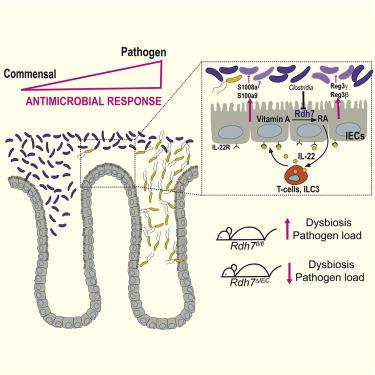Our official English website, www.x-mol.net, welcomes your
feedback! (Note: you will need to create a separate account there.)
Commensals Suppress Intestinal Epithelial Cell Retinoic Acid Synthesis to Regulate Interleukin-22 Activity and Prevent Microbial Dysbiosis.
Immunity ( IF 25.5 ) Pub Date : 2018-12-18 , DOI: 10.1016/j.immuni.2018.11.018 Mayara Grizotte-Lake 1 , Guo Zhong 2 , Kellyanne Duncan 1 , Jay Kirkwood 2 , Namrata Iyer 1 , Irina Smolenski 1 , Nina Isoherranen 2 , Shipra Vaishnava 1
Immunity ( IF 25.5 ) Pub Date : 2018-12-18 , DOI: 10.1016/j.immuni.2018.11.018 Mayara Grizotte-Lake 1 , Guo Zhong 2 , Kellyanne Duncan 1 , Jay Kirkwood 2 , Namrata Iyer 1 , Irina Smolenski 1 , Nina Isoherranen 2 , Shipra Vaishnava 1
Affiliation

|
Retinoic acid (RA), a vitamin A metabolite, regulates transcriptional programs that drive protective or pathogenic immune responses in the intestine, in a manner dependent on RA concentration. Vitamin A is obtained from diet and is metabolized by intestinal epithelial cells (IECs), which operate in intimate association with microbes and immune cells. Here we found that commensal bacteria belonging to class Clostridia modulate RA concentration in the gut by suppressing the expression of retinol dehydrogenase 7 (Rdh7) in IECs. Rdh7 expression and associated RA amounts were lower in the intestinal tissue of conventional mice, as compared to germ-free mice. Deletion of Rdh7 in IECs diminished RA signaling in immune cells, reduced the IL-22-dependent antimicrobial response, and enhanced resistance to colonization by Salmonella Typhimurium. Our findings define a regulatory circuit wherein bacterial regulation of IEC-intrinsic RA synthesis protects microbial communities in the gut from excessive immune activity, achieving a balance that prevents colonization by enteric pathogens.
中文翻译:

共生体抑制肠上皮细胞视黄酸合成,调节白细胞介素 22 活性并防止微生物失调。
视黄酸 (RA) 是一种维生素 A 代谢物,以依赖于 RA 浓度的方式调节转录程序,从而驱动肠道中的保护性或致病性免疫反应。维生素 A 从饮食中获取,并由肠上皮细胞 (IEC) 代谢,而 IEC 与微生物和免疫细胞密切相关。在这里,我们发现属于梭菌纲的共生细菌通过抑制 IEC 中视黄醇脱氢酶 7 (Rdh7) 的表达来调节肠道中的 RA 浓度。与无菌小鼠相比,常规小鼠肠道组织中的 Rdh7 表达和相关 RA 含量较低。 IEC 中 Rdh7 的缺失减少了免疫细胞中的 RA 信号传导,减少了 IL-22 依赖性抗菌反应,并增强了对鼠伤寒沙门氏菌定植的抵抗力。我们的研究结果定义了一个调节回路,其中细菌对 IEC 内在 RA 合成的调节可以保护肠道中的微生物群落免受过度免疫活动的影响,从而实现防止肠道病原体定植的平衡。
更新日期:2018-12-18
中文翻译:

共生体抑制肠上皮细胞视黄酸合成,调节白细胞介素 22 活性并防止微生物失调。
视黄酸 (RA) 是一种维生素 A 代谢物,以依赖于 RA 浓度的方式调节转录程序,从而驱动肠道中的保护性或致病性免疫反应。维生素 A 从饮食中获取,并由肠上皮细胞 (IEC) 代谢,而 IEC 与微生物和免疫细胞密切相关。在这里,我们发现属于梭菌纲的共生细菌通过抑制 IEC 中视黄醇脱氢酶 7 (Rdh7) 的表达来调节肠道中的 RA 浓度。与无菌小鼠相比,常规小鼠肠道组织中的 Rdh7 表达和相关 RA 含量较低。 IEC 中 Rdh7 的缺失减少了免疫细胞中的 RA 信号传导,减少了 IL-22 依赖性抗菌反应,并增强了对鼠伤寒沙门氏菌定植的抵抗力。我们的研究结果定义了一个调节回路,其中细菌对 IEC 内在 RA 合成的调节可以保护肠道中的微生物群落免受过度免疫活动的影响,从而实现防止肠道病原体定植的平衡。











































 京公网安备 11010802027423号
京公网安备 11010802027423号